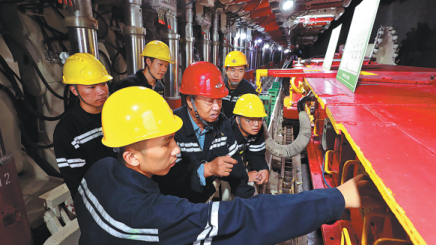University up to speed with industry advances
Updated: 2023-04-14

Shanxi Institute of Technology students are taught at the joint training center founded by the university and Huayang Group. [Photo provided to China Daily]
A tech-based university should closely follow the trends of social and economic growth and give equal priorities to education, research and the industrial application of technologies. That is demonstrated in the four-decade development history of a university in the eastern Shanxi city of Yangquan.
Yangquan used to be a city heavily relying on coal mining, which was also the highlight of curriculum design of Shanxi Institute of Technology based in the city in its early days.
When it was established in 1984, the university had coal mining as its sole major subject. Today it boasts 34 disciplines centering on and beyond coal mining.
The university's officials said its curriculum development in recent years corresponds to the development trend of Shanxi's energy industry.
The industry in Shanxi is now implementing an energy revolution campaign featuring upgrading the coal mining sector toward safer, cleaner and more efficient operations; diversifying the coal mining sector to multiple segments that include new materials and chemicals; and strengthening the development of new energy sources.
Responding to this new trend, Shanxi Institute of Technology began to change its philosophy governing curriculum design, which has become increasingly "problem-oriented" since 2014, according to Zhang Changqing, Party secretary of the university.
He explained that a problem-oriented philosophy means that a university should have the ability to identify and solve problems arising from evolving economic and industrial situations. And this ability can be acquired through research into the local economy and adjusting curriculum design to new situations.
"As Shanxi is upgrading and diversifying its coal industry, we have included such disciplines as mechanics, electrics, safety engineering, new materials, automation and digital technologies in our curriculum plan over the past years, in addition to such traditional subjects as geological engineering, survey and mining," Zhang said.
The official said that close cooperation with industrial enterprises is a viable way to enhance a university's capabilities in research and education and helps to grow its abilities to identify and solve problems.
For instance, the university and local industrial giant Huayang Group jointly established a training center.
The center, simulating in-shaft coal mining scenarios, covers an area of 4,300 square meters and boasts 98 sets of equipment.
"With this center, our students can better master hands-on skills and be better positioned for their career development in the future," said Wang Kai, a university official responsible for students' skills training.
After finishing training at the center, students can have further opportunities to receive on-site training at Huayang's production sites, learning to operate various machines and equipment from Huayang's engineers and technicians.
"This is a win-win program," Wang said. "Huayang helps to train our students by giving them the opportunity to get familiar with the latest technologies and equipment, and we support Huayang through offering them well-educated graduates."
Shanxi Institute of Technology has also collaborated with local enterprises in establishing corporate doctorate work stations.
Lyu Lihua, a PhD researcher at the university's material sciences and engineering department, is now the head of a doctorate work station in Yingyu Ceramics in Pingding county.
Over the past two years, his team has developed a number of cutting-edge products for the company, helping it tap into new markets.
Jia Lijun contributed to this story.



